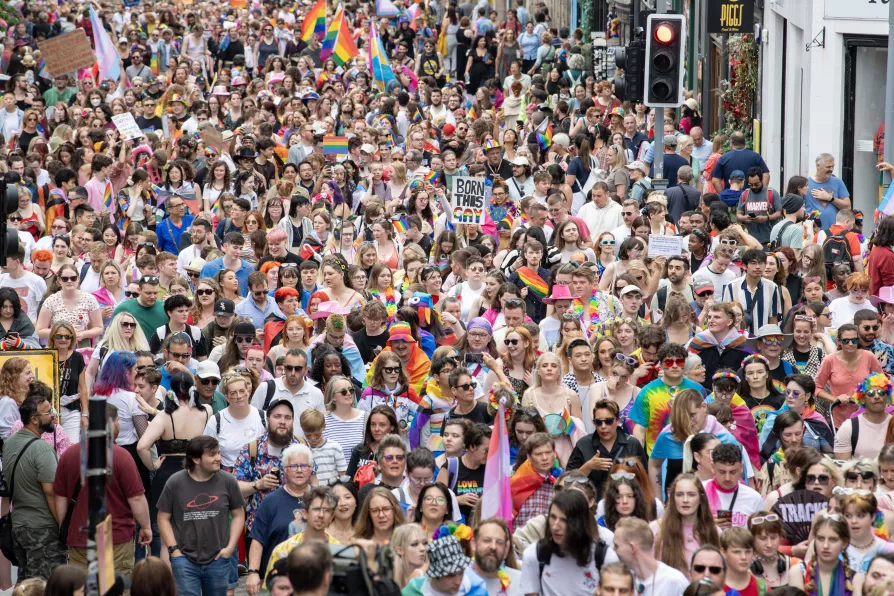The PM says Mandelson 'betrayed our values' – but ministers and advisers flock to line their pockets with corporate cash, says SOLOMON HUGHES

 People take part in the Pride Edinburgh 2023 parade through Edinburgh city centre, June 24, 2023
People take part in the Pride Edinburgh 2023 parade through Edinburgh city centre, June 24, 2023
AT OUR Unison national delegate conference last year, we as delegates voted that 2024 is the Year of LGBT+ Workers.
We recognise that there has been much positive change in attitudes over the past decades, you need only look at the number of towns and cities throughout Britain which participate in Pride celebrations across Britain.
However, the LGBT+ community rightly remind us that Pride is a protest. For too many LGBT+ people they still do not live in a world free from prejudice and fear.
The Rainbow Map produced annually by the International Lesbian, Gay, Bisexual, Trans and Intersex Association Europe benchmarks countries from 0 per cent to 100 per cent on a range of different criteria — hate crime, hate speech, discrimination, harassment, and family rights.
It paints an extremely bleak outcome for Britain. Britain has dropped down to 17th place in the ranking.
This is due to the increased rise in hate crimes against LGBT+ people, anti-trans views in both mainstream media and social media and lack of progress on banning conversion therapy.
Just last week I attended a drag show in Glasgow by the performer Tina Burner — don’t you just love the drag names! She is a New Yorker and as part of her act details her life story in terms of her struggle for acceptance for her art and the increasing barriers to performing.
In the US there have been over 510 anti-LGBT+ pieces of legislation introduced last year, and the American Civil Liberties Union is currently tracking another 487 Bills which are planned for 2024.
Tennessee is one of several states to ban drag shows and even includes the very real possibility of being arrested if found in drag. There are issues such as forced outing, where a school will require teachers to inform parents if their student uses a different name or pronoun at school.
The school curriculums are, in many states, very restrictive in terms of allowing instruction on issues of gender and sexuality. In Florida, there is even the Don’t Say Gay campaign within schools, which many states have followed.
Of course, all this has shades of what we in Britain remember only too well: Clause 28 of the Local Government Act 1988 introduced under Thatcher’s Conservative government. It was rightly repealed in Scotland in June 2000 and in November 2003 in England and Wales.
But that is not to say that there have not been attempts to reintroduce a form of this homophobic and transphobic legislation.
There is also the current mainstream media misinformation around drag story time in schools and libraries and the number of anti-LGBT+ politicians, and media commentators.
But there was good news that Laurence Fox, actor-turned-Reclaim Party founder has now to pay £180,000 in damages after he lost a High Court libel case with drag artist Crystal (Colin Seymour) and former Stonewall trustee Simon Blake.
The platform that case has given to expose what the judge called “distinctively homophobic” has been used to full effect. Let us not forget this was the man who burned the trans flag in his garden and saw fit to film it and put it on his Instagram.
So, what part can unions play? For us in Unison, the LGBT+ self-organised group has been actively running an excellent Trans Ally educational programme available to our branches and committees.
At our Scottish Council in February, delegates gave a commitment to increase the number of LGBT+ branch officers across all our branches in local government, health, and the community sectors.
If we can encourage more of our LGBT+ members to take on the role of branch officer, it can help to make a positive difference to the working lives of all our LGBT+ members.
It also raises visibility and awareness which means that we all have a part to play to ensure that there is a positive legacy ensuring more inclusive workplace policies.
Equally important is that any behaviours that are anti-LBGT+ are challenged and eradicated. Unison’s 2024 Year of LGBT+ Workers gives us an ideal and timely opportunity to play a part in supporting and standing by our LGBT+ members, remembering that an injury to one is an injury to all.
We hope to see not only a positive difference to the working lives of our LGBT+ members but a rise in the ranking on the Rainbow Map.
Brenda Aitchison is a Unison Scottish committee member.

LYNNE WALSH reports from the Women’s Declaration International conference on feminist struggles from Britain to the Far East













